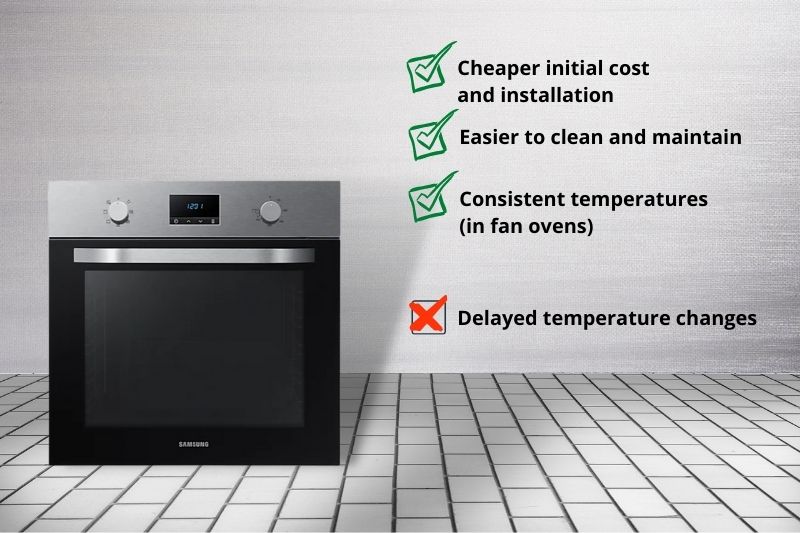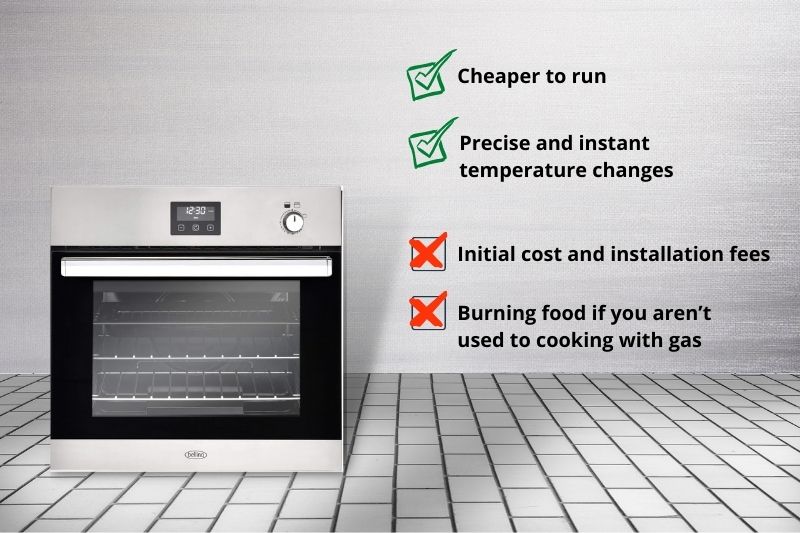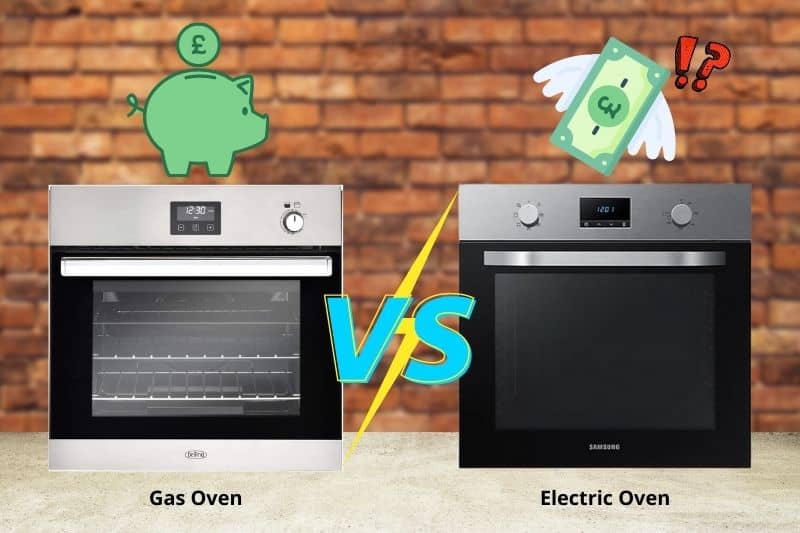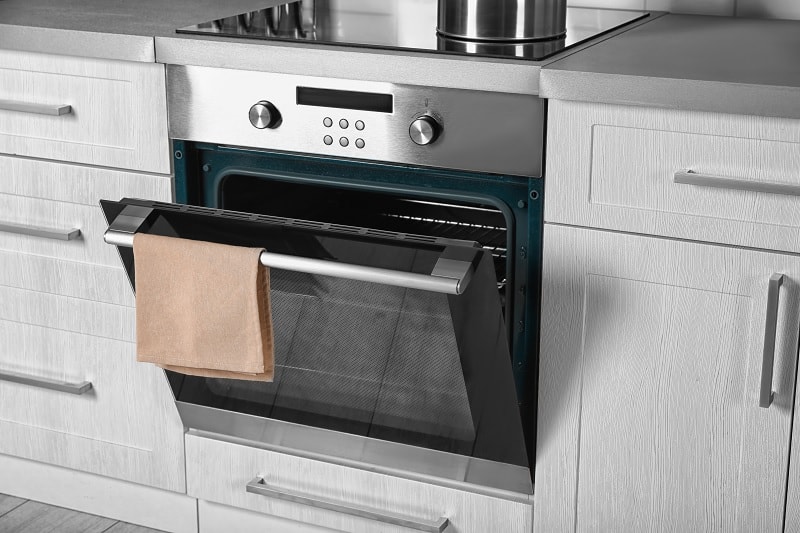When you’re buying a new oven, it is always worth exploring your options. Choosing the right oven for your needs usually comes down to fuel type, capacity, and initial cost.
Running costs, however, are also worth considering. While oven running costs are unlikely to break the bank, the cost of running certain types of ovens can be quite shocking.
So, let’s find out if gas ovens are cheaper to run than electric ovens, shall we?
Cost of Running a Gas Oven
The average gas oven uses roughly 1.24 kWh of energy per use.
To arrive at this figure, we looked at five of the most popular gas ovens in the UK and calculated the average energy use based on figures from AO.com:
- Hisense BI6061HGSUK – 0.97 Kwh
- Smeg Cucina AOSF64M3G2 – 1.15 Kwh
- Indesit IDG6GW – 1.44 Kwh
- Hotpoint HDG5GDCB – 1.25 Kwh
- Beko KA52NEW – 1.39 Kwh
The average gas price in the UK is 5.93 per kWh for the price cap period from 1 January to 31 March 2026.
This means that the average gas oven costs 1.24 x 5.93 = 7.4 pence per use.
Cost of Running an Electric Oven
The average electric oven uses 0.89 kWh of energy per use.
To arrive at this figure, we looked at ten of the most popular electric ovens in the UK and calculated the average energy use based on figures from AO.com:
- AEG DUB331110M – 0.78 kWh per use
- Beko RecycledNet BBRDF21000X – 0.79 kWh per use
- Bosch Serie 2 NBS113BR0B – 0.8 kWh per use
- Bosch Serie 4 HBS573BB0B – 0.99 kWh per use
- Hotpoint Class 2 SA2844HIX – 1.05 kWh per use
- Indesit Aria IDU6340IX – 0.96 kWh per use
- NEFF N30 U1CHC0AN0B – 0.81 kWh per use
- NEFF N50 B2ACH7HH0B – 0.99 kWh per use
- Smeg Victoria DOSF6920N1 – 0.99 kWh per use
- Zanussi ZPHNL3X1 – 0.71 kWh per use
The average electricity price in the UK is 27.69p per kWh for the price cap period from 1 January to 31 March 2026.
This means that the average electric oven costs 0.89 x 27.69 = 24.6 pence per use.
Gas vs. Electric Oven Running Costs
According to our research, electric ovens are more than twice as expensive to run as gas ovens on average.
Even though electric ovens are more energy efficient and use less energy to run, they are still more expensive than gas since electricity prices are so high.
Electricity costs more than three times as much as gas per kilowatt hour, so it’s not surprising that gas ovens are cheaper to run.
The average gas oven costs 7.4 pence per use, while the average electric oven costs 24.6 pence.
If you use your oven once a day, here is how that would work out:
- Per day: 7.4 pence for a gas oven; 24.6 pence for an electric oven.
- Per week: £0.52 for a gas oven; £1.72 for an electric oven.
- Per month: £2.25 for a gas oven; £7.48 for an electric oven.
- Per year: £27.01 for a gas oven; £89.79 for an electric oven.
This means you could save over £60 a year by using a gas oven instead of an electric oven with today’s prices.
There aren’t as many gas ovens as electric ovens on the market these days, but they are still available and aren’t being phased out yet.
However, if you are buying a new oven, you need to consider installation costs as well as running costs.
Should You Choose a Gas or Electric Oven?
Gas is much cheaper to run than electric. However, this doesn’t mean that a gas oven is a right oven for you.
For example, if you don’t have a gas hook-up for your oven already, the cost of having one installed will likely be higher than any of the savings you’ll get from the oven.
You also need to factor in which oven you prefer to use. Some people swear by gas, others swear by electric. I can say from experience, having owned electric ovens all my life, that switching to gas in my first ever rented property was a big learning curve.
Electric ovens
There is no doubt that gas ovens are brilliant tools, but many of us prefer electric.
Electric ovens are typically a bit cheaper to install, and the initial cost is often cheaper than a gas oven. They also cook with dry heat, so they are much better for baking and roasting (although many gas fans will argue this case).

Most electric ovens also have fans nowadays, so the temperature in the oven is much more stable and consistent and food cooks more evenly. Electric hobs are also much easier to clean than gas hobs.
Of course, electric ovens do heat up a lot slower than gas ovens. In general, they take about 10 minutes longer to heat up than gas ovens. They are also much less responsive to temperature changes as well.
Gas ovens
Gas gives you much more control than electric. You can really dial in a temperature on a gas hob or oven, and it responds almost instantly.

Gas is less forgiving than electric, though, so burning your food is very easy to do in a gas oven. Gas cookers also tend to be a bit more expensive to buy and install than their electric counterparts, but budget gas cookers are available.
Safety is another concern with gas, of course, but all gas ovens have strict safety guidelines they must adhere to, so safety isn’t something that should factor into your decision too much.
The Pros and Cons of Gas Ovens
Pros
- Cheaper to run
- Precise and instant temperature changes
Cons
- Initial cost and installation fees
- Burning food if you aren’t used to cooking with gas
The Pros and Cons of Electric Ovens
Pros
- Cheaper initial cost and installation
- Easier to clean and maintain
- Consistent temperatures (in fan ovens)
Cons
- Delayed temperature changes
Conclusion
As you can see, both gas and electric ovens have their pros and cons, and it is really up to you to decide which fuel type you’ll prefer.
Gas is certainly the cheaper of the two ovens to run. They cost about half as much as electric ovens, and you could save over £60 each year by buying a gas oven, unless gas becomes more expensive relative to electricity in the future. However, it ultimately comes down to which oven you prefer to use.
We hope this look at which type of oven is cheaper to run has helped you decide which oven you’ll buy next. If you want to see the best gas cookers or electric ovens available in the UK right now, please explore Chef’s Pick further.

Scott is a writer and a passionate home chef. His passion for cooking began when he was 10 years old. Scott has been writing professionally for over five years now and loves to combine his passion for cooking with his day job.







